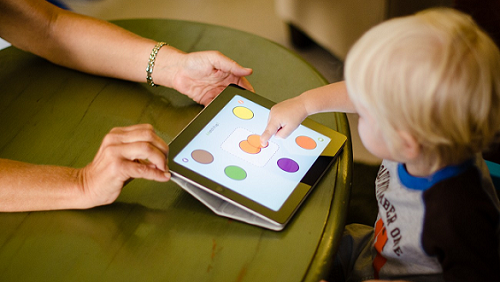
For the first time, toddlers with autism have demonstrated significant improvement after intensive intervention by parents rather than clinicians, according to a new study from Florida State University researchers. The findings are published online ahead of print in the journal Pediatrics.
“We’ve come up with a treatment model that can teach parents to support their child’s learning during everyday activities, and we’ve documented that the children improved their developmental level, social communication skills and autism symptoms,” said Dr. Amy Wetherby, director of the Autism Institute at Florida State University’s College of Medicine and lead author of the study.
Social communication includes eye gaze, facial expressions, gestures, sounds, sharing of emotion, listening, learning to understand words, discovering how to use objects — things that children with autism have difficulty learning. In young children, disruption in these social learning mechanisms limits their opportunities to learn about the environment and can lead to even greater problems with social behaviors in later life.
Unfortunately, most children are not diagnosed with autism spectrum disorder (ASD) until age 4 — and even later in lower-income, rural and minority families. By contrast, the American Academy of Pediatrics urges every child to be screened at 18 and 24 months of age.
Early diagnosis, however, does little good without early intervention.
Because social learning is so important, some psychological scientists are trying to develop ways to work with toddlers who show early signs of autism. For example, several interventions have been developed to teach joint attention and imitation in very young children with ASD. In one such intervention, reciprocal imitation training, a therapist might play with the child by imitating what he is doing, then encourage him to imitate her. These techniques are generally also taught to parents to practice at home and expand opportunities for learning.
In recent years, some intervention trials had achieved improved outcomes for children but required an inaccessible amount of time from clinicians. Others that focused on teaching parents how to work with their children found that the parents learned, but the children didn’t show significant gains from the treatment.
This latest study, “Parent-Implemented Social Intervention for Toddlers with Autism: An RCT,” outlines the results of a seven-year randomized controlled trial, in which families of 82 toddlers with ASD — all of whom were 18 months old — were assigned to one of two nine-month interventions.
At-home, parent-led intervention improved autism symptoms
In the first intervention group, families attended a group session at a clinic once per week in which they were taught how to support their children’s social development. Families in the second intervention group learned the same skills, but the training was delivered three times per week on an individual basis at home and in the community, rather than in a weekly group clinic class.
The team found that children in both groups increased their use of words and showed improvements in overall autism symptoms. However, children in the second group improved even more on measures of understanding and social communication, indicating that the individual sessions at home may be a more effective approach to treating autism in toddlers.
During the at-home intervention, families were taught how to embed strategies to support social communication throughout everyday activities — not only play but also meals and snacks, caregiving, family chores, etc. — and how to bring their children into that activity. They were instructed to work with their children in this manner for 20-25 hours each week. Parents also received guidance on using these strategies in the community (e.g., restaurants, grocery stores, playgrounds, etc.) to foster the development of social-communication skills outside of the home.
“We tried to help parents make interactions fun and fruitful learning moments. But we also taught the parents how to push their child — because their child has autism, and we are finding these children at this very critical moment when their brain is more able to learn. If the parent can start early, then we are more likely to change the child’s trajectory of learning for the rest of their life.”
These findings are particularly encouraging because the treatment approach is “viable for any community” and could be offered “to all families of toddlers with autism,” said Dr. Wetherby. Moreover, she added, “it’s affordable, and it’s efficient in terms of clinicians’ time.”
Dr. Wetherby and her Autism Institute team are already looking ahead and planning to expand their work on early intervention. With a grant from the National Institutes of Health, they’re working with Emory University researchers to identify autism and begin intervention in children as young as 12 months. They’re also interested in looking at children with language delays, a much larger share of the population.
“This approach might work for them, too,” Dr. Wetherby said. “We want to find out.”
